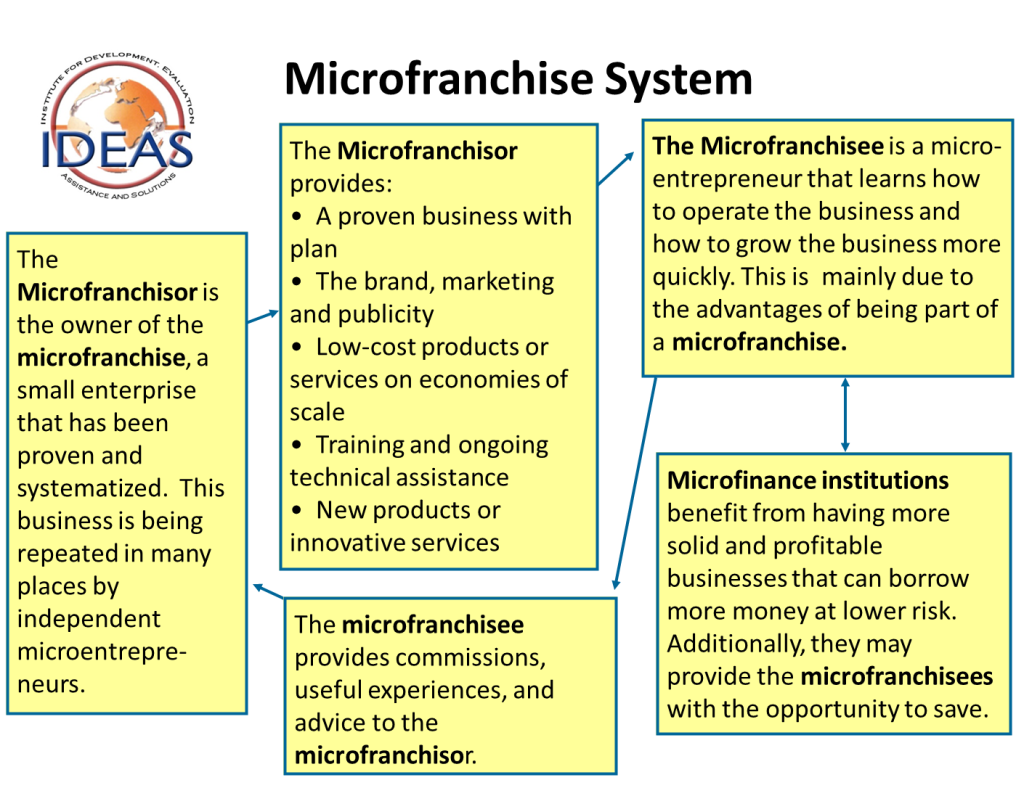TecAp is the first microfranchise in Nicaragua
Microfranchising, based on some of the advantages of the commercial franchising system but tailored to help replicate poor women’s microenterprises, has been very successful in Asia and Africa but is largely unknown in Latin America. An IDEAS study based on interviews of 50 enterprise development professionals in 2011 and paid for by the Inter-American Development Bank found no example of a microfranchise in Nicaragua but lots of potential. With our pilot, we have proven there to be an exciting new market opportunity and have started to build the first microfranchise based on women selling solar and new technologies. Less than a year after we started, other organizations are beginning to copy the TecAp model for other poor communities. We continue our work as social entreprenuers in creating new mechanisms of economic opportunity for low income people.
What is microfranchising?
A microfranchise is a proven business with established operations and marketing strategies that can be easily replicated by a microentrepreneur who is a microfranchisee with the technical assistance of a microfranchisor.
Microfranchising is an innovative & less subsidized way of developing microenterprises that grow quickly.
Who is a microfranchisee?
A microfranchisee is a very small business woman or man who gets technical support and advice to make her/his micro enterprise grow much more quickly and systematically.
How does microfranchising help a microfranchisee grow faster?
- Make the transition from a subsistence business to a formal business
- Not only generate more income but also to create employment opportunities for people outside of the family
- Gradually grow to become a more solid and formal business
- This constant and consistent growth appeals to both the microfranchisee and the microfinance institution.
How is microfranchising similar and different to commercial franchising?
To learn more about microfranchising from a document written by IDEAS, click here.
Diagram below describes how Microfranchising works
(Click on the diagram to make it expand)
Some of the recent activities by IDEAS in promoting microfranchising include:
- A course at the American University in Nicaragua (UAM) as a part of the Masters in Microfinance
- A presentation at the Regional Conference on MFIs in Central America (REDCAMIF Network)
- Extensive research terminating in a 100-page study on the Potential for Microfranchising in Nicaragua. Done for UAM and the Chamber of Commerce, paid for by Inter-American Development Bank FOMIN
- Conference and a workshop for the National Commission for Micro and Small Enterprises (CONAMYPE) in El Salvador. Ongoing advice leading to a program.
- Research in Guatemala with members of REDIMIF
- A seminar at Pfeiffer University in North Carolina in the US
- A graduate level course at Tulane University in New Orleans, LA in the US
IDEAS’ Consultancy Services for Microfranchising
The Institute for Development, Evaluation, Assistance & Solutions (IDEAS), which has three and a half decades of work in community economic development on four continents, is a leader in social entrepreneurship. Now IDEAS is offering microfranchise consultancy services. Our experiences and successes in microfinance and microenterprise development have fostered a strong interest in helping to introduce microfranchising in Latin America. For more than 20 years, as IDEAS has evaluated the impact of microfinance, performed market research and participated in social performance evaluations, we have grown increasingly concerned about the lethargic growth of microentrepreneurs and the relatively small percentage of microenterprises that graduate into successful small businesses. We believe that microfranchising offers a more effective method of enterprise development that can overcome barriers in start-up and, in combination with proven strategies, can offer a more comprehensive solution to help microentrepreneurs rapidly grow their own businesses.
